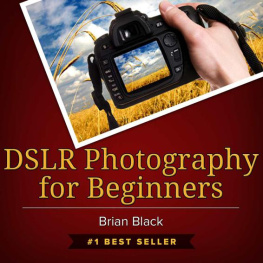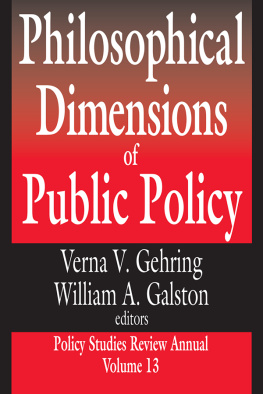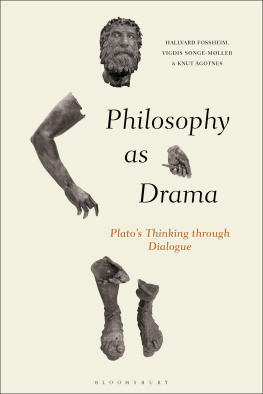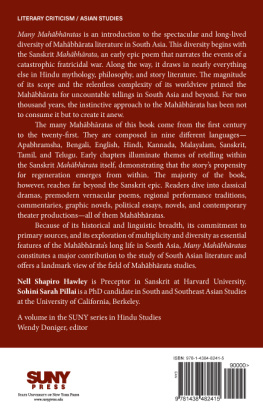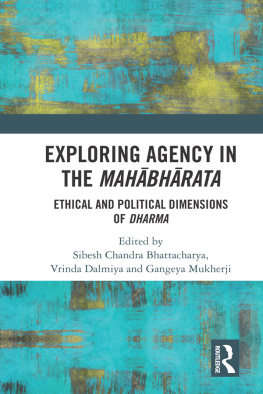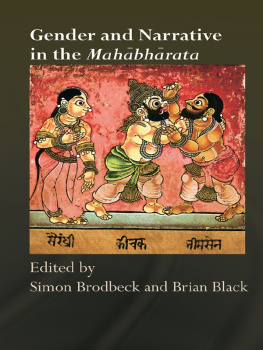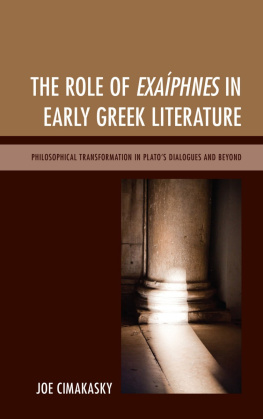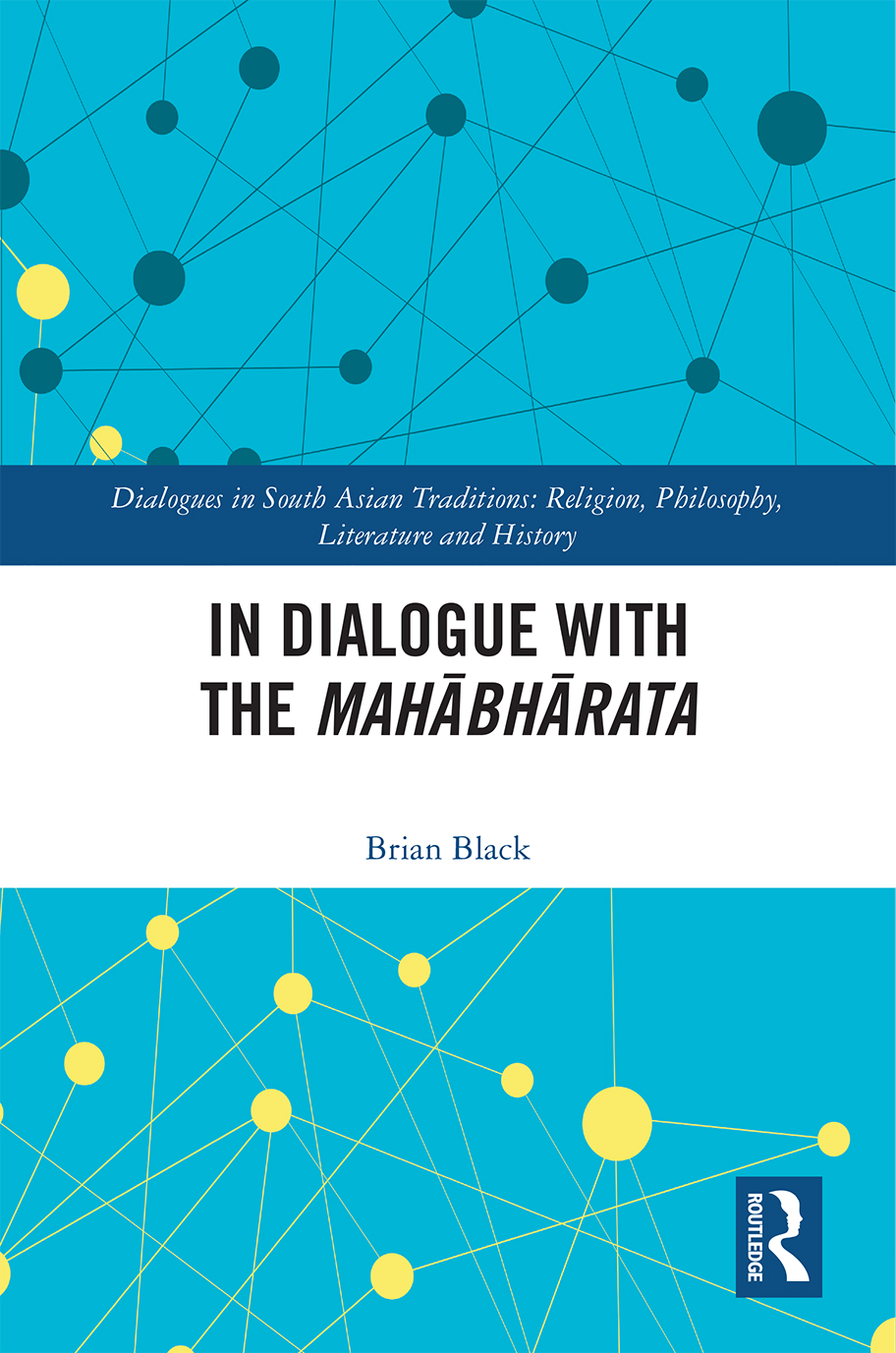
In an ocean of studies on the Grand Epic The Mahbhrata Brian Blacks voice is unique, fresh and compelling. In a careful and detailed dialogic reading of select plots involving central characters like Bhishma, Draupadi, Duryodhana and Sri Krishna, the author points out inherent dialogicality in the epic text. This work is an important contribution to Indological and Dialogic Studies.
Lakshmi Bandlamudi,
Professor,
City University of New York.This wonderfully rich book by Brian Black emphasizes the often noted subtlety of the dharma in the Mahbhrata, and brilliantly shows how that subtlety carries different connotations depending on who is speaking, and the circumstances. This insightful work provides depth and specificity to our view of the texts presentation of the dharma as subtle, and is a major contribution to our understanding of the Mahbhrata.
Bruce M. Sullivan,
Professor Emeritus,
Northern Arizona University.In Dialogue with the Mahbhrata
The Mahbhrata has been explored extensively as a work of mythology, epic poetry, and religious literature, but the texts philosophical dimensions have largely been under-appreciated by Western scholars. This book explores the philosophical implications of the Mahbhrata by paying attention to the centrality of dialogue, both as the texts prevailing literary expression and its organising structure. Focusing on five sets of dialogues about controversial moral problems in the central story, this book shows that philosophical deliberation is an integral part of the narrative. Black argues that by paying attention to how characters make arguments and how dialogues unfold, we can better appreciate the Mahbhratas philosophical significance and its potential contribution to debates in comparative philosophy today.
This is a fresh perspective on the Mahbhrata that will be of great interest to any scholar working in religious studies, Indian/South Asian religions, comparative philosophy, and world literature.
Brian Black received his MA and PhD at SOAS (University of London) and is now a lecturer in the Department of Politics, Philosophy and Religion at Lancaster University. His research interests include Indian religion and philosophy, comparative philosophy, the use of dialogue in Indian religious and philosophical texts, and Hindu and Buddhist ethics. He is the author of the book The Character of the Self in Ancient India: Priests, Kings, and Women in the Early Upaniads.

Dialogues in South Asian Traditions
Religion, Philosophy, Literature and History
Series Editors:
Laurie Patton, Middlebury College, USA
Brian Black, Lancaster University, UK
Chakravarthi Ram-Prasad, Lancaster University, UK
Face-to-face conversation and dialogue are defining features of South Asian traditional texts, rituals, and practices. Not only has the region of South Asia always consisted of a multiplicity of peoples and cultures in communication with each other, but also performed and written dialogues have been indelible features within the religions of South Asia; Hinduism, Buddhism, Jainism, Sikhism, and Islam are all multi-vocal religions. Their doctrines, practices, and institutions have never had only one voice of authority, and dialogue has been a shared tactic for negotiating contesting interpretations within each tradition.
This series examines the use of the dialogical genre in South Asian religious and cultural traditions. Historical inquiries into the plurality of religious identity in South Asia, particularly when constructed by the dialogical genre, are crucial in an age when, as Amartya Sen has recently observed, singular identities seem to hold more destructive sway than multiple ones. This series approaches dialogue in its widest sense, including discussion, debate, argument, conversation, communication, confrontation, and negotiation. Opening up a dynamic historical and literary mode of analysis, which assumes the plural dimensions of religious identities and communities from the start, this series challenges many outdated assumptions and representations of South Asian religions.
In Dialogue with the Mahbhrata
Brian Black
For more information and a full list of titles in the series, please visit: https://www.routledge.com/Dialogues-in-South-Asian-Traditions-Religion-Philosophy-Literature-and-History/book-series/ASTHASIAREL
First published 2021
by Routledge
2 Park Square, Milton Park, Abingdon, Oxon OX14 4RN
and by Routledge
52 Vanderbilt Avenue, New York, NY 10017
Routledge is an imprint of the Taylor & Francis Group, an informa business
2021 Brian Black
The right of Brian Black to be identified as author of this work has been asserted by him in accordance with sections 77 and 78 of the Copyright, Designs and Patents Act 1988.
All rights reserved. No part of this book may be reprinted or reproduced or utilised in any form or by any electronic, mechanical, or other means, now known or hereafter invented, including photocopying and recording, or in any information storage or retrieval system, without permission in writing from the publishers.
Trademark notice: Product or corporate names may be trademarks or registered trademarks, and are used only for identification and explanation without intent to infringe.
British Library Cataloguing-in-Publication Data
A catalogue record for this book is available from the British Library
Library of Congress Cataloging-in-Publication Data
Names: Black, Brian, 1970 author.
Title: In dialogue with the Mahbhrata / Brian Black.
Description: Abingdon, Oxon ; New York : Routledge, 2021. |
Includes bibliographical references and index.
Identifiers: LCCN 2020026724 (print) | LCCN 2020026725
(ebook) | ISBN 9780367436001 (hardback) | ISBN
9780367438142 (ebook)
Subjects: LCSH: MahbhrataCriticism, interpretation, etc. |
Dialogue in literature.
Classification: LCC BL1138.27 .B59 2021 (print) | LCC BL1138.27 (ebook) | DDC 294.5/923046dc23
LC record available at https://lccn.loc.gov/2020026724
LC ebook record available at https://lccn.loc.gov/2020026725
ISBN: 978-0-367-43600-1 (hbk)
ISBN: 978-0-367-43814-2 (ebk)
Typeset in Sabon
by codeMantra
To Yulia, Harrison, and Sonya
This book is not only about dialogue, but it is also very much the product of the many conversations, discussions, and debates I have had with colleagues, students, and friends about the Mahbhrata. There are many dialogue partners I would like to thank for their feedback and insights during the time I have been writing this book. First, I thank my colleague Chakravarthi Ram-Prasad, with whom I have been discussing the Mahbhrata, as well as other topics in Indian philosophy and religion, for the past ten years. I also thank the Arts and Humanities Research Council, which provided the financial support and teaching cover for me to write this book.
I offer heartfelt thanks to Naomi Appleton, who has read drafts of every chapter, as well as a draft of the final manuscript. Her feedback, support, and friendship has been invaluable throughout this entire process. I also express my sincere gratitude to Jackie Hirst, who after hearing me deliver a rather speculative conference paper eight years ago told me I was writing a book before I realised it myself. She has read drafts of many chapters, offering indispensable feedback each time.
Next page

